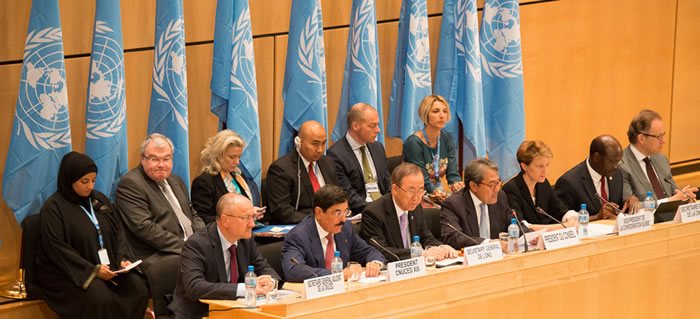Fiftieth anniversary meeting reaffirms UNCTAD’s commitment to multilateral approach to trade and development.
United Nations Secretary-General Ban Ki-moon hailed UNCTAD’s contribution to the UN’s development work as “vital” in an address to a special session of UNCTAD’s Trade and Development Board convened to mark the organization’s fiftieth anniversary.
“With the creation of UNCTAD, all members of the United Nations Organization explicitly adopted a development perspective,” Mr. Ban, speaking in the Assembly Hall of the Palais des Nations at the UN office in Geneva on 17 June, said. “Over the past half century, the entire United Nations family has strengthened its commitment to fair and inclusive socioeconomic development.”
“Our task today is in some senses more difficult than it was 50 years ago,” Mr. Ban said. “If we are to succeed in our quest for sustainable development, we will have to strengthen multilateral cooperation and global partnerships. In preparation for post-2015 [when new development targets will be in place], we in the United Nations system are working on making ourselves ‘fit for purpose’. As an anchor in the UN’s development pillar, UNCTAD has a vital role to play in helping to deliver the post-2015 agenda.”
After opening remarks by the President of the Trade and Development Board Triyono Wibowo of Indonesia, Mr. Ban’s remarks were followed by a statement from UNCTAD Secretary-General Mukhisa Kituyi. Also speaking were Ms. Simonetta Sommaruga, Vice-President of the Swiss Confederation, Mr. Hamad bin Abdulaziz Al-Kawari, Minister of Culture, Arts and Heritage of Qatar (which hosted the most recent UNCTAD ministerial meeting in Doha in 2014) and a video message from Ms. Eda Rivas, the foreign minister of Peru, where the next ministerial meeting of UNCTAD will take place in 2016.
 Trade and Development Board, Twenty-eighth special session on the occasion Fiftieth Anniversary of UNCTAD Front row (from left to right): Mr. Petko Draganov, Mr. Hamad bin Abdulaziz Al-Kawari, Mr. Ban Ki-moon, Mr. Triyono Wibowo, Ms. Simonetta Sommaruga, Mr. Mukhisa Kituyi and Mr. Michael Møller |
Dr. Kituyi said that the anniversary event held personal resonance: as a Kenyan growing up in a newly independent state, Dr. Kituyi said he strongly identified with the aspirations of developing nations to use international trade as a route out of poverty.
In his remarks, Dr Kituyi made a strong reaffirmation of UNCTAD’s commitment to the principle of multilateralism and recapitulated UNCTAD as a key player in the post-2015 development agenda.
“The agenda we define should aim to create conditions that will allow more countries to achieve the kind of ‘virtuous circles’ of productive investment, rising incomes, poverty reduction and expanding markets that bring about lasting economic and social transformation,” Dr. Kituyi said.
Dr. Kituyi added: “In early 2016, less than two years from now, UNCTAD XIV will take place in Lima, Peru. Before then, in addition to the deliberations to establish Sustainable Development Goals, there will be a number of important meetings held under the UN's auspices. These are set to include conferences of Small-Island Developing States and Landlocked Developing Countries, as well as on climate change and financing for development. We will have a unique opportunity to work as One UN and make the linkages that will allow us to help shape a brighter future.”
Ms. Sommaruga said that it was already clear in 1964 that redressing global inequality through trade was achievable, given the rich resource-base of many developing countries, but progress had been incremental. UNCTAD, she said, has become a vital actor in this area. Speaking as a representative of Switzerland, the global commodities trading hub, Ms. Sommaruga acknowledged that more could be done to make the trade in mineral and raw material wealth more transparent and respectful of the rule of law and respect for human rights.
Mr. Al-Kawari said that as humanity rose from the ashes of the Second World War, it was able to aspire to noble ideals through the creation of the United Nations. Among those aspirations was a fair trading system – the creation of UNCTAD was a statement of this ideal. It had to be remembered, Mr Al-Kawari said, that UNCTAD was a development organization first and foremost. One of its most precious duties was to protect and promote multilateral negotiating culture, and Dr, Kituyi’s creation of the Geneva Dialogue programme of debates about the post-2015 agenda was an example of this.
Finally, Ms. Rivas praised UNCTAD’s record of pragmatic policy recommendations and programmes, noting that it had been an important source of technical assistance to middle-income nations such as Peru. The success of UNCTAD XIV, the ministerial meeting to take place in Lima in 2016, will be Peru’s lasting tribute to Peru’s record of success, Ms. Rivas said.
In opening the special session Mr. Wibowo said: "In the coming days, we will have many opportunities to reflect on the past 50 years and look forward to what must be done in the next 50 to address the very deep and persistent development challenges that the post-2015 development agenda would seek to overcome. As we do so, let us remember the high scope of ambition for UNCTAD."


